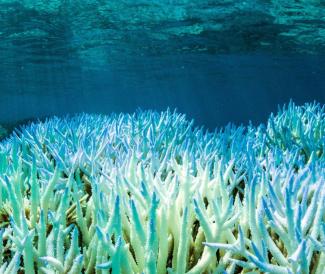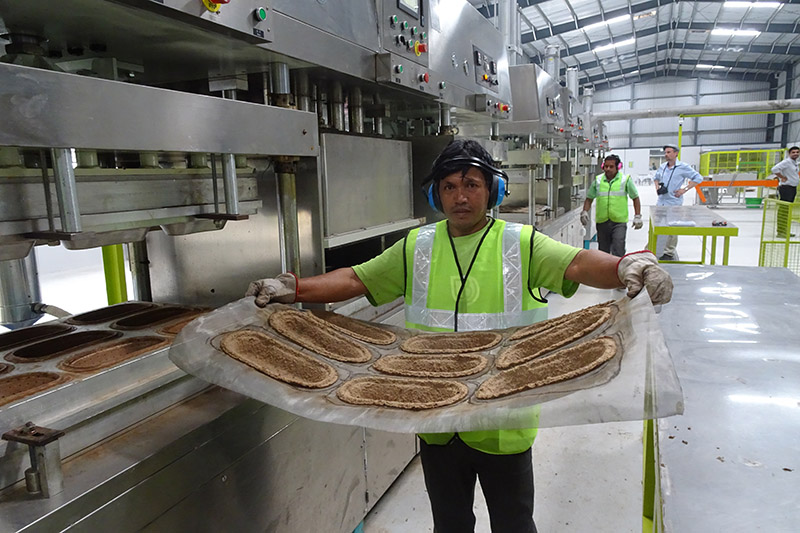Marine ecology
Saving the seas

The sea level is rising, huge patches of plastic are floating in the oceans, and 90 % of the fish stocks are overfished or heavily exploited. The death of corals and mangroves add to the problem. Only 3.4 % of marine areas are under protection, and only often on paper, but not in practice.
Germany’s Federal Ministry for Economic Cooperation and Development (BMZ) has developed an action plan to protect more marine areas, organise a larger share of worldwide fishing in a sustainable way and let less rubbish end up in the oceans. Coastal towns in poor countries particularly need support to deal with the consequences of the rising sea level, said Minister Gerd Müller when he launched the action plan in May. Furthermore, he wants developing countries to get more assistance for implementing marine protection measures. The BMZ is setting up a new fund for this purpose (see box).
The new action plan consists of the following ten points:
- Create more marine reserves and manage them better
The BMZ will assist governments that create new reserves, strengthen their administration and contribute to long-term viability through sustainable funding instruments. This way, the ministry wants to contribute to achieving the goal of securing effective protection for 10 % of the world’s marine areas by 2020, as was agreed in the context of the Convention on Biological Diversity (CBD). - Foster sustainable artisanal fishing and aquaculture
The livelihoods of about 58 million people directly depend on fishing. According to estimates, 10 to 12 % of the world population generate their income directly or indirectly in this sector. Small-scale fishery and aquaculture protect marine resources, generate local incomes and provide crucial food products, including for disadvantaged people. The BMZ will foster better management of fish stocks in partner countries. - Foster sustainability and social responsibility in fish processing and marketing
Global fish consumption has grown dramatically. Many fish stocks are being exploited to the brink of ecological sustainability and even beyond. Accordingly, the economic development of affected regions is threatened. Furthermore, labour conditions in many countries’ fishing industries do not meet international standards. The BMZ will support sustainable supply chains in order to conserve fish stocks and improve working conditions. - Assist partner countries in the fight against illegal, informal and unregulated fishing
Illegal fishing robs the affected coastal countries of annual revenues worth up to $ 23 billion. It impedes sustainable resource management, deprives local people of important food and hampers the development of the local economy. The BMZ will assist its partners in setting up control systems and fosters the development of regional approaches to fight illegal and unregulated fishing. - Set up strategic partnerships with businesses
Sustainable coastal and maritime tourism is crucial to conserve marine and coastal ecosystems. The BMZ plans to raise awareness in the tourism industry and among the general public in Germany for related issues. - Assist partner countries in the reduction of marine pollution
It makes sense to eliminate the causes of marine pollution. For this purpose, the BMZ will further strengthen its environmental cooperation with particular partner countries. Together, model approaches to integrated waste management are to be developed. Goals include treating waste appropriately, reducing the amounts of garbage and recycling a greater share. - Draft strategies to cope with potentially irreversible damages of marine ecosystems
Marine ecosystems are changing irreversibly due to the acidification and warming of the oceans and the overfishing of coastal waters. The BMZ will promote research projects that help to better understand causes and effects and result in options for action. It will also foster alternative job opportunities for people who lose their livelihoods due to environmental damage. In addition, the ministry will support initiatives to help poor people to cope with disasters. - Assist coastal regions in the adaption to climate change
In a few years, two-thirds of the world population will live in coastal regions, mostly in cities. They are put at risk by the rising sea level and extreme weather events such as hurricanes and cyclones, which are occurring ever more often. The BMZ will help cities to adapt to climate change, respond to disasters and tackle the issues in anticipatory and sustainable urban development. - Set up more early warning systems for the effects of climate change
More than 600 million people live in low-lying coastal areas. They suffer directly from effects of climate change such as storms, floods, soil salinisation and the rising sea level. The BMZ
pledges support for establishing early warning systems in combination with coastal protection and urban development projects. Another goal is to take into account flood protection and disaster protection into developmental planning. - To support cross-cutting cooperation across borders
Cross-boarder approaches and the consideration of multi-fold interests and needs – including fishing, transport, nature conservation, infrastructure development and tourism – are crucial for effective marine conservation. The BMZ will support the “Partnership for Regional Ocean Governance”, an international initiative that is geared to assisting nations and regional organisations in creating innovative strategies for marine protection.
The BMZ is currently organising a “Tour for the future” (Zukunftstour) through all of Germany’s federal states. The protection of coastal and marine areas is one feature of the tour. The ministry is hosting various events and uses interactive formats to promote its “Charter for the future” (Zukunftscharta). The charter was published in 2014 and spells out eight fields of action for sustainable development.
Katja Dombrowski
Links
BMZ action plan for marine protection and sustainable fishing (only available in German):
http://www.bmz.de/de/zentrales_downloadarchiv/web-apps/aktionsplan-meeresschutz-und-nachhaltige-fischerei.pdf
BMZ Zukunftstour (Tour for the future - only available in German):
http://zukunftstour.zukunftscharta.de/startseite.html
Zukunftscharta (Charter for the future - only available in German):
https://www.zukunftscharta.de/infos-zur-zukunftscharta.html













